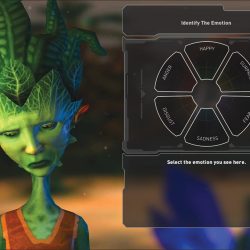Game On

Constance Steinkuehler was told studying how people learn by playing online multiplayer games, such as Lineage, would end her career. © 2012 NC Interactive, Inc. All rights reserved.
Research on the educational power of video games takes a professor to the White House.
It began with power pellets, gobbling ghosts, and Ms. Pac Man.
As a kid growing up in the 1980s, Constance Steinkuehler MS’00, PhD’05 spent plenty of time in the arcade. And she was pretty good.
Her days of playing games are far from over, although since mid-September, the UW assistant professor of education has been at the White House, serving as a senior policy analyst in the Office of Science and Technology Policy. It’s her job to help craft policies that can support the development of games for educational or training purposes and to encourage positive behavorial changes such as healthful eating and exercise.
“Games have evolved into a pretty serious medium,” Steinkuehler says.
Her eighteen-month term has her juggling life in Washington, D.C., with life in Madison, where her husband, Kurt Squire, an associate professor of education, and their two small children live.
“I couldn’t turn down this opportunity,” says Steinkuehler, who in addition to her UW degrees, in 1993 earned three bachelor degrees (math, English, and religious studies) simultaneously at the University of Missouri-Columbia.
While many games are played merely for fun, Steinkuehler and her team are looking at how the federal government can mobilize the private sector and philanthropic organizations into developing more games for education, civic improvement, and health — games for good, as she likes to call them.
Steinkuehler’s interest didn’t really start with games themselves. Rather, she was fascinated by how they helped people learn. For five years, she studied human interaction online, and researched and developed online environments designed specifically for learning. Study participants were given activities to do and were either paid for their time or given extra credit.
“I got really tired of feeling like I was studying people in spaces who were being cajoled or bribed into being there,” Steinkuehler says.
But in 2001, she entered the medieval world of castle sieges by downloading Lineage, an online game that requires people to pay to participate.
“After that, I changed everything I was doing and have studied games ever since,” she says.
Her 2005 dissertation in the literacy studies program focused on the people playing Lineage and how they learned.
“They were doing activities far more difficult than we would’ve asked them to,” Steinkuehler says. To this day, her alter ego for Lineage is Princess Adelaide, a moniker taken from her grandmother’s middle name. Although she no longer has time to play the game, she keeps the princess “alive” by paying a monthly fee.
Her unconventional field of study did have some colleagues wondering if it was wise to pursue.
“People said my career was over,” she says. But the concerns were unfounded, and today she’s part of a cutting-edge field that is getting academic attention — and games are being developed that didn’t seem possible in the era of Ms. Pac Man.
Foldit is one such revolutionary game. Developed at the University of Washington’s Center for Game Science, it challenges players to learn about the shapes of proteins, and then compete online to fold them into the most efficient shapes. Ultimately, it could help to diagnose disease and develop cures.

“Games can help solve problems,” says Steinkuehler, who works in the White House Office of Science and Technology Policy. Photo: Bryce Richter
Last year, President Barack Obama told students at the TechBoston Academy that he would like to see educational software that’s every bit as compelling as the best video game.
“I want you guys to be stuck on a video game that’s teaching you something other than just blowing something up,” Obama said. While video games are often criticized as being violent, Steinkuehler notes that such games are only a small fraction of the market. She sees enormous potential in taking a medium that kids already enjoy and finding ways to benefit their lives.
Just as games have changed, so have the players, who no longer fit the stereotype of teenage boys.
The Entertainment Software Association, a game-industry trade group, recently found that the typical gamer is thirty-seven years old and that 42 percent of players are women. Two-thirds of households play video games.
While many people wouldn’t call themselves gamers, they happily pass time playing Angry Birds or other game apps on smartphones.
“The term gamer is really antiquated,” Steinkuehler says.
Games are here to stay — and here to help. “We need to show people that Foldit isn’t a one-off — that games can help solve problems,” she says.
Published in the Summer 2012 issue



Comments
No comments posted yet.